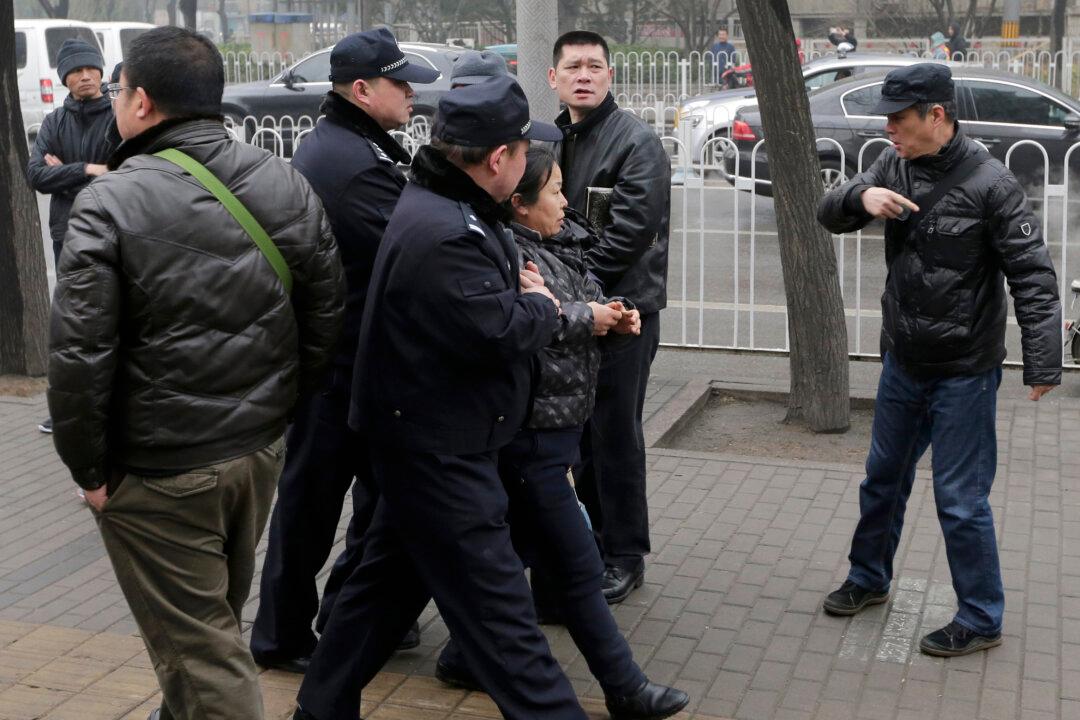BEIJING—Several Chinese rights lawyers, including a woman who represented high-profile women’s rights advocates, have been formally arrested on state subversion charges about six months after they were taken away, fellow lawyers said Wednesday.
The serious charge carries a potential sentence of life imprisonment and is an indication that the ruling Communist Party sees this group of lawyers as a threat to its monopoly on power.
The lawyers have sought to use China’s own laws to hold officials accountable or to protect citizens who have been critical of the government, though they also have been linked to protests outside courthouses that authorities have labeled as illegal attempts to short-circuit the judicial system.
Maya Wang, a Hong Kong-based researcher with Human Rights Watch, said charging lawyers with state subversion was “unprecedented.”
“It is an attempt to strangle the burgeoning human rights lawyers community, and by extension, the wider civil society,” the researcher said.
Li Yuhan, a lawyer for Wang Yu, said Wednesday that Wang Yu’s mother had received formal arrest notices for the lawyer on a charge of state subversion. Her husband, Bao Longjun, was arrested for allegedly inciting state subversion, a charge that is less serious but which also carries a maximum penalty of life in prison.
Wang Yu defended one of the five women, who became known as the Feminist Five and were detained last March after they planned to hand out flyers against sexual harassment in several Chinese cities in a case that drew international scrutiny.

The families of two other lawyers and an intern lawyer in the same law firm as Wang, Beijing-based Fengrui, were informed earlier of their arrests on suspicion of state subversion, said lawyer Liu Xiaoyuan.
Zhao Wei, an assistant to the well-known rights lawyer Li Heping, also has been arrested on suspicion of state subversion. Li’s whereabouts are unknown.
In a troubling sign, Li said she has been barred from meeting with Wang Yu since her detention in July. Other defendants also have been denied access to lawyers.
There had not been any known cases of state subversion in recent years. Chinese authorities have typically charged individual activists — including Nobel Peace Prize laureate Liu Xiaobo — with inciting state subversion for their speech, or punished those engaged in collective actions, such as the New Citizens movement, which promoted civil society, on the charge of provoking troubles or disturbing public orders.
Inciting state subversion is considered a lesser charge to state subversion, although both carry a maximum penalty of life in prison.
Dissident Hu Jia said the ruling party has become more confident with its standing both internationally and at home, and feels it can crack down hard on rights lawyers with the more severe charge.
“It doesn’t feel it needs to be roundabout,” Hu said. “Literally, the charge can cast a wider shadow on more people.”
Shortly after the lawyers were rounded up in July, state media accused them of being rabble rousers intent on illegal activism. The reports depicted them as self-promoters who spread half-truths and arranged illegal protests outside court venues to put undue pressure on local authorities.
The Ministry of Public Security has lauded the detentions of the lawyers and civil activists as busting a “major crime gang.”
The U.S. State Department has condemned the detentions and called for the release of the lawyers, who it said were “seeking to protect the rights of Chinese citizens.”
On Wednesday, fellow rights lawyer Yu Wensheng said the crackdown sets back China’s rule of law. “Yet personally I believe, the more they suppress, the stronger the resistance becomes,” Yu said.





